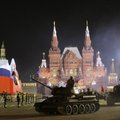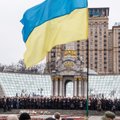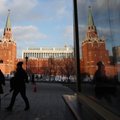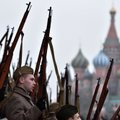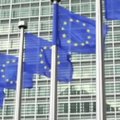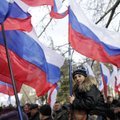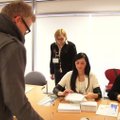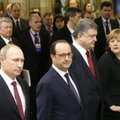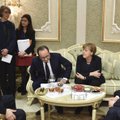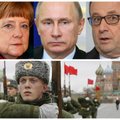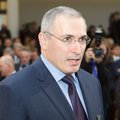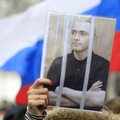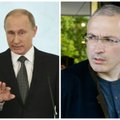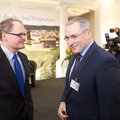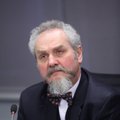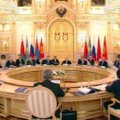I purposefully chose a title for my piece to evoke the notorious phrase from 1949 by the then US Secretary of Defense, James Forrestal: "The Russians are coming. The Russians are coming. They’re right around. I’ve seen Russian soldiers."
Eastern Europe Studies Centre
87 straipsnių
Lithuanian and foreign experts have called on Ukraine to make use of a fragile truce with pro-Russian separatists and carry out reforms.
The European Neighbourhood Policy (ENP) is the instrument through which the European Union (EU) aims to create bonds between its Member States and the countries at the boundaries of the EU and thus secure the stability of the European borders. The EU stipulates Association Agreements offering financ...
According to Lithuanian State Security Department's (VSD) activity report for 2014, Russia's intelligence services are using Russian journalists and representatives of non-governmental organisations to spy on and discredit the Russian opposition. Journalists and representatives of NGOs are also moni...
The world has truly entered a new era. Even Russia's nuclear blackmail has become such an everyday occurrence that it sometimes passes underappreciated. One concludes thus after last week's reports in British dailies The Times and The Independent about a meeting between Russian and US generals in Ma...
The Lithuania Tribune / EN.DELFI TV spoke to Linas Kojala, Analyst at the Eastern Europe Studies Centre. European Council is looking at suggestions made by Lithuania and other eastern member states that are designed to counter propaganda and information attacks against the European Union. What are t...
The Lithuania Tribune / EN.DELFI TV spoke to Linas Kojala, Analyst at the Eastern Europe Studies Centre. It’s been a year since Crimea was annexed. How Russia was successful in incorporating this territory, we asked Mr. Kojala.
The Lithuania Tribune / EN.DELFI TV spoke to Linas Kojala, Analyst at the Eastern Europe Studies Centre. We spoke about the result of the Lithuania's municipal elections.
After 14 hours of tough talks, the leaders of Russia, Ukraine, France and Germany have reached an agreement on what to do about situation in eastern Ukraine, where hostilities have already claimed over 5,400 lives. However, the leaders did not hold a customary joint press conference.
The outcome of the ongoing talks in Minsk might be "bad" or "very bad", says Laurynas Kasčiūnas, an analyst from the Vilnius-based Eastern Europe Studies Centre, commenting on the talks on the situation in eastern Ukraine that continue in the Belarusian capital of Minsk on Thursday.
While Ukraine's government forces are fighting pro-Russia separatists in the eastern Donbass region, Western leaders are engaging in a tense diplomacy game with Russian President Vladimir Putin.
Russian people are living in an alternative reality created for them by President Vladimir Putin, one completely disconnected from the rest of the world, says German political scientist Andreas Umland, senior research fellow, at Kyiv-based Institute for Euro-Atlantic Cooperation.
Mikhail Khodorkovsky's speech in Vilnius last week drew considerable controversy, with some saying his suggestions of easing economic sanctions on Russia played right into Vladimir Putin's interests, while others noting Khodorkovsky's sober and measured reasoning. The following is a full transcript ...
The Snow Meeting is a highlight of the European security calendar. It is like Davos, except that it is smaller and full of people who really know what is going on (Davos is full of people who would like to know what is going on).
This January, the Vilnius-based Eastern Europe Studies Centre organized a big two-day international event for experts, politicians and intellectuals. The centrepiece of the second day of the conference was an address by Mikhail Khodorkovsky.
This January, the Vilnius-based Eastern Europe Studies Centre organized a big two-day international event for experts, politicians and intellectuals. The centrepiece of the second day of the conference was an address by Mikhail Khodorkovsky.
This January, the Vilnius-based Eastern Europe Studies Centre organized another big two-day international event for experts, politicians and intellectuals. The centrepiece of the second day of the conference was an address by none other than Mikhail Khodorkovsky. He was introduced by liberal Lithuan...
The Merchants' Guild building on Gedimino Avenue in central Vilnius hosted a conference in late November 2013 which featured Ukraine's opposition players.
The source of current problems in Russia - and, by extension, perturbations in Central and Eastern Europe - is the fact that the Russian society failed to cut all ties with the soviet past back in the 1990s, says Russian historian Andrey Zubov.
The Lithuania Tribune / EN.DELFI TV spoke to Linas Kojala, analyst at the Eastern Europe Studies Centre. We asked Kojala what we can expect from the Astana meeting as regards situation in Ukraine.
